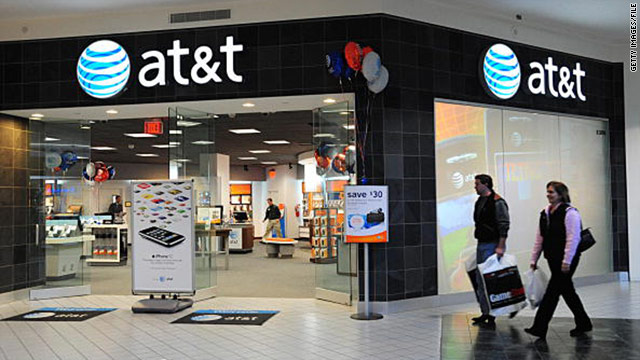Merger between AT&T, T-Mobile finds unlikely allies
Orlando, Florida (CNN) -- Among many consumer and tech bloggers, the initial reaction to AT&T's proposal to acquire T-Mobile USA was venomous -- and skeptical that such a marriage between two giants would be allowed by federal regulators.
But in the last day or so, analysts, nonprofit organizations and even executives for the carriers' top competitor have predicted that this deal will go through. Some even say it may not be all that bad for customers.
Nonprofits concerned with education and health initiatives, including the United States Distance Learning Association, the Institute for e-Health Policy and the Hispanic Federation, are publicly expressing their support. They say the move would make faster wireless internet more accessible and would facilitate applications in health care and other areas.
The news has dominated the conversation here at the CTIA Wireless conference, the largest annual gathering for the U.S. wireless industry.
AT&T's commitment to cover 95% of the U.S. population with a next-generation wireless internet service, called 4G LTE, has been a key point in helping the proposal win favor among potential critics. Previously, AT&T's plans had accounted for 80% of Americans.
"We're at the very beginning of a major industry shift here to build powerful LTE networks, which will prove to be the critical infrastructure for the United States economy," AT&T CEO Randall Stephenson said in a call Monday with investors. "It's already changing the delivery model for both education and health care."
In countless discussions here at CTIA, many people have stopped even naming the two companies, instead calling it "the news." CTIA CEO Steve Largent even did this in his introductory keynote, describing "news of things taking place in the wireless industry."
Some critics at this convention say the 5% that gets left out of AT&T's equation makes up a fairly large geographical portion of the map. AT&T measures coverage by population, which is concentrated in cities, and not geographical area. Some sparsely populated areas will be left behind.
Still, AT&T's promise is an aggressive one. Verizon Wireless said Tuesday that it plans to cover 147 U.S. cities with its 4G network by the end of this year, but it did not provide a population number or percentage. The company said in October that its December launch would cover 110 million Americans -- just over one-third of the populace.
Despite the fact that a combined AT&T-T-Mobile could displace Verizon as the largest U.S. carrier by revenue, Verizon Wireless CEO Dan Mead and CTO David Small said in interviews that they are neither worried about nor opposed to the merger.
"I'm not concerned with what the other guys are up to," Mead said. "We had a dozen acquisitions to create Verizon."
Sprint, the other big carrier, is less agreeable. Sprint was reportedly in talks to acquire T-Mobile before AT&T swooped in.
"I do have concerns that it would stifle innovation and that too much power would be in the hands of two [companies]," Sprint CEO Dan Hesse said at a panel discussion at the CTIA conference. T-Mobile CEO Philipp Humm was also scheduled to participate, but he canceled, along with others on his team, after the news.
With Sprint left standing at the altar, the carrier may need to take some kind of action. But Verizon's Mead said Monday night that his company has no plans to bid for Sprint.
The Department of Justice and the Federal Communications Commission will review AT&T's blockbuster deal before it can go through. FCC Chairman Julius Genachowski declined to comment during his keynote address at the CTIA Wireless conference Tuesday morning.
A panel of analysts, along with others here, say that after reviewing details of the proposal, AT&T will probably be granted approval to buy T-Mobile. The carrier may need to make concessions -- perhaps significant ones -- and the process could take many months, analysts say.
The two may have to divest customers in certain areas where their combined market share is too high by federal standards. This could benefit the other carriers because they could potentially bid for those subscribers.
"I think we have a tremendous amount of competition in the wireless industry," Verizon's Mead said during the CEO panel discussion.
But consumers and advocacy groups still worry about what happens when two of the biggest competitors tie the knot. Consumers Union, the nonprofit publisher of Consumer Reports, said the benefits of the acquisition aren't clear. Public Knowledge, a digital rights organization, said Verizon and a strengthened AT&T could act as bullies who stifle competition.
Fending off criticism has become a habit for AT&T, which has taken a beating for perceptions about the quality of its network. Executives for the carrier say the merger would improve quality, give T-Mobile customers access to more desirable phones and accelerate buildout of LTE, its 4G network. The companies noted in a statement that T-Mobile had "no clear path to delivering LTE."
"This will improve network quality," AT&T's Stephenson said during Monday's call. "It will give more customers access to more services. It will bring advanced LTE capabilities to virtually every community across the United States."
Reff: http://edition.cnn.com/2011/TECH/mobile/03/22/att.tmobile.allies/index.html
Subscribe to:
Post Comments (Atom)







0 comments:
Post a Comment